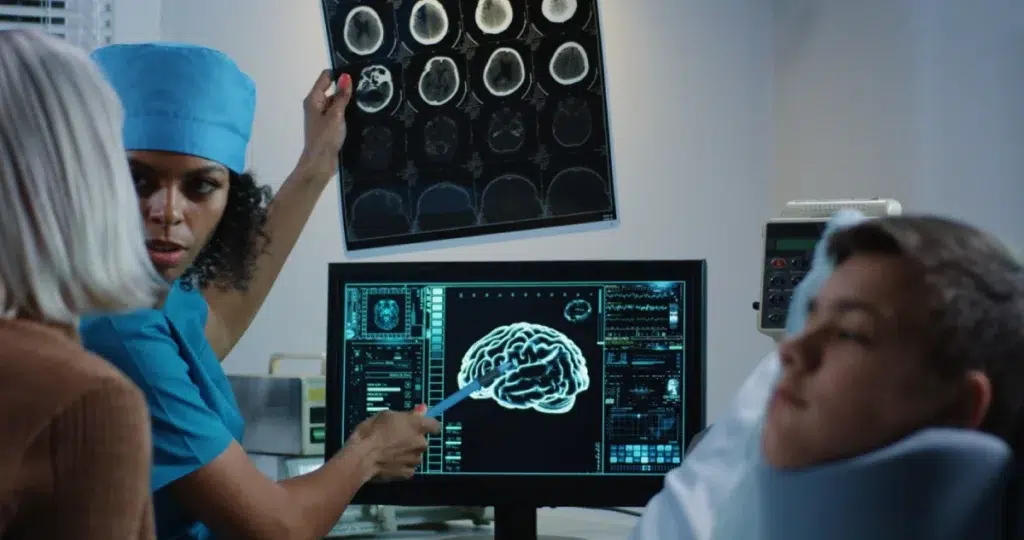According to the U.S. Centers for Disease Control, over 200,000 Americans were hospitalized for brain injuries in 2021. Thousands more were treated and released or never sought medical care. These injuries, ranging from concussions to permanent brain damage, caused tens of thousands of deaths and a range of short and long-term disabilities in survivors.
You can pursue compensation for your brain injury under California law. A personal injury claim can help you pay for past and future medical costs as well as lost wages resulting from your brain injury. Getting fair compensation means maximizing your settlement. Valuing a brain injury claim, California insurance companies and juries will consider the severity of the injury and its impact on your life.
Understanding Traumatic Brain Injuries
A traumatic brain injury (TBI) occurs when brain tissue suffers damage or destruction by an external force. The brain includes several protective layers, including the skull, meninges, and cerebrospinal fluid. These structures cushion the brain and protect it from outside forces.
A TBI can result from four primary types of trauma:
Blunt-Force Trauma
You can suffer blunt-force trauma when an object strikes your head without piercing the skull. Thus, the damage to the brain tissues occurs due to the impact’s jolt and the subsequent brain movement. When the brain moves inside the skull, it collides with the protective structures, damaging it and potentially causing swelling and bleeding.
This trauma is common in falls. Sports injuries and motor vehicle accidents can also result in blunt-force head injuries that damage the brain.
Rapid Acceleration and Deceleration Trauma
Head injuries are not necessary to produce brain injuries. A whipping motion can cause the brain to move violently inside the skull and tear apart brain cells.
This type of trauma is responsible for the traumatic brain injuries that result from whiplash caused by car accidents. It can also produce an injury called abusive head trauma, commonly referred to as shaken baby syndrome.
Penetrating Trauma
A penetrating traumatic brain injury occurs when something pierces the brain. It could be a foreign object like a nail or bullet. However, the object could also come from your body, such as a skull fragment. In either case, the object lacerates the brain and could cause tissue damage and bleeding.
Explosive Trauma
An explosion can cause a traumatic brain injury even if you do not suffer a head injury. Explosions cause pressure waves that radiate outward. When a pressure wave hits you, it can compress your brain, potentially rupturing cells and blood vessels.
Why Compensation Is Crucial for TBI Victims

Even a mild traumatic brain injury can cause cognitive and physical impairments. These symptoms can include:
- Persistent headaches
- Dizziness or nausea
- Partial or total paralysis
- Confusion
- Difficulty concentrating
- Memory loss
- Vision or hearing loss
A brain injury can also produce emotional symptoms, such as depression, anxiety, and mood swings. As a result, TBI victims often face expenses for medical treatments to stabilize their situations.
However, brain injury victims often require ongoing medical care, physical therapy, and occupational therapy because the brain does not heal. Instead, the treatment strategy usually includes extensive therapy to help the brain rewire itself around the damaged areas using its inherent neuroplasticity.
In many cases, the patient’s traumatic brain injury prevents them from working. Even a mild traumatic brain injury, called a concussion, can cause chronic or recurring symptoms for several months after the accident. These symptoms might limit the person’s ability to focus, move, or work for long periods.
Thus, compensation is critical in these cases to ensure the injured person receives the treatment and therapy they require. It also helps to mitigate the financial burden of the patient’s medical bills and lost wages.
Factors Affecting Traumatic Brain Injury Settlement Amounts
The main factors affecting traumatic brain injury settlements include the severity of the injury and the nature of the symptoms.
Specifically, a severe traumatic brain injury will typically receive a larger average settlement than a mild traumatic brain injury. Severe injuries require more extensive treatments and surgeries than mild brain injuries. As a result, they will have a more profound effect on your medical bills and ability to work.
Similarly, certain symptoms will have a greater impact on your life than others. Temporary symptoms, such as headaches and dizziness will not force you to alter your life. However, a permanent disability like vision loss or paralysis will typically justify a higher average settlement for traumatic brain injury.
This is partly because you will have higher medical expenses for permanent injuries. Additionally, severe brain injuries will also have a greater impact on your quality of life, thereby justifying a larger settlement for pain and suffering.
Types of Damages in Traumatic Brain Injury Cases
The compensation you can seek in a traumatic brain injury claim can cover your economic and non-economic damages. Economic losses include the financial impacts of your traumatic brain injury, including the following:
- Past and future medical expenses
- Past lost wages
- Diminished future earnings
- Out-of-pocket costs related to your traumatic brain injury, such as ambulance fees
The goal of reimbursing your economic losses is to ensure the financial cost of your injuries falls on the at-fault party rather than you, the victim.
You can also claim compensation for non-economic damages based on the reduced quality of life caused by your injuries. Examples of non-economic damages include the following:
- Pain and suffering
- Loss of enjoyment of life due to your inability to participate in activities you formerly enjoyed
These losses do not come with a price tag. Instead, the insurer will base the “pain and suffering” portion of your settlement for traumatic brain injury on the severity of the injury and the degree to which it permanently affected your physical abilities.
Proving Liability in Traumatic Brain Injury Cases
The strength of your case could affect the brain injury settlement your injury attorneys can negotiate. Specifically, insurance companies and at-fault parties put more effort into settling personal injury claims with strong evidence of liability.
If you and your attorney have difficulty proving liability, the insurer and at-fault party may prefer to take their chances with a jury rather than negotiating a TBI settlement. You can prove liability in personal injury cases in the following three ways:
Intentional Tort
If your traumatic brain injury (TBI) resulted from an intentional act, such as a battery or other violent act, you can show liability by showing the other party intended to make harmful contact with you. You do not need to prove they intended to injure you. Simply proving they acted intentionally will be enough.
Negligence
You can recover compensation for a traumatic brain injury caused by someone else’s negligence. Negligence means the other party failed to act with reasonable care. This theory is used for unintentional injuries caused by car accidents or other careless acts.
You prove liability for negligence by showing that the other party failed to exercise the care and caution that was reasonable under the circumstances and that your traumatic brain injury resulted from that lack of care.
Strict Liability
Strict liability is applied in narrow situations under California law. The most likely situation in which strict liability will apply to a traumatic brain injury involves product liability.
Manufacturers are strictly liable for injuries caused by defective products. This means you do not need to prove the manufacturer’s intent or knowledge. Instead, you only need an experienced TBI lawyer to prove that the product was defective and the defect caused your traumatic brain injury.
The Role of Insurance Coverage in Traumatic Brain Injury Settlements
Many accidents are covered by liability insurance. The most common situation involves car accidents. However, many other events that can cause a brain injury also involve insurance companies, such as slip and fall accidents and incidents involving defective products.
Personal injury cases usually begin with an insurance claim. This claim will describe your accident and the losses you incurred. The insurer will investigate your claim and either accept or deny it. If the insurer denies the claim, an experienced attorney can fight the claim denial.
The opportunity to negotiate a brain injury settlement comes when the insurer accepts the claim. Once the insurer accepts liability, your injury attorneys can discuss a fair TBI settlement amount with the insurer.
Understanding Traumatic Brain Injury Settlement Values
Negotiations for a brain injury claim settlement in California require both the victim and the insurer to compromise. The insurer might offer a number below the expenses you incurred, including your mounting medical bills and income losses.
Your law firm might counter with a higher number that includes your pain and suffering. Eventually, the goal is to agree on a number that covers all of your hard costs and provides something for your non-economic losses.
However, one additional wrinkle that may arise is the insurance policy limit. The insurer can only offer a settlement for traumatic brain injuries up to the policy limit. Any additional settlement funding must come from the insured party.
How Long Does It Take to Reach a Settlement?
The time needed for settlement negotiations will depend on the case’s complexity. When you claim that someone else’s negligence caused your injury, you must back it up with evidence.
Moreover, the other party might successfully assert that you contributed to the cause of the accident. When this happens, your compensation is reduced in proportion to your share of the fault under a doctrine called comparative negligence.
Your personal injury attorney will fight to reduce your share of the blame as much as possible to negotiate a fair settlement of your TBI claim.
In practice, this means that a straightforward TBI claim might get resolved within a few months. However, additional factual or legal complexity could make a significant difference in the time needed to resolve the case. In some situations, you may even need to file a lawsuit to push the other party into a final settlement of your claim.
The Importance of Experienced Representation
The right legal representation will have the experience and legal knowledge to gather evidence proving the other party’s liability. They understand how to value your claim fairly so you receive the compensation required to meet your needs. The right lawyer will also have the negotiation skills to persuade the other party’s insurer to settle your claim.
Contact Us to Discuss Your Brain Injury Claim Settlement
A traumatic brain injury (TBI) can change your life forever. You may face significant cognitive and physical disabilities that interfere with your ability to work or even meet your needs. However, you can often seek financial compensation when someone else’s actions contributed to your injury.
Contact us for a free consultation to discuss how we can assist you with your brain injury settlement.



